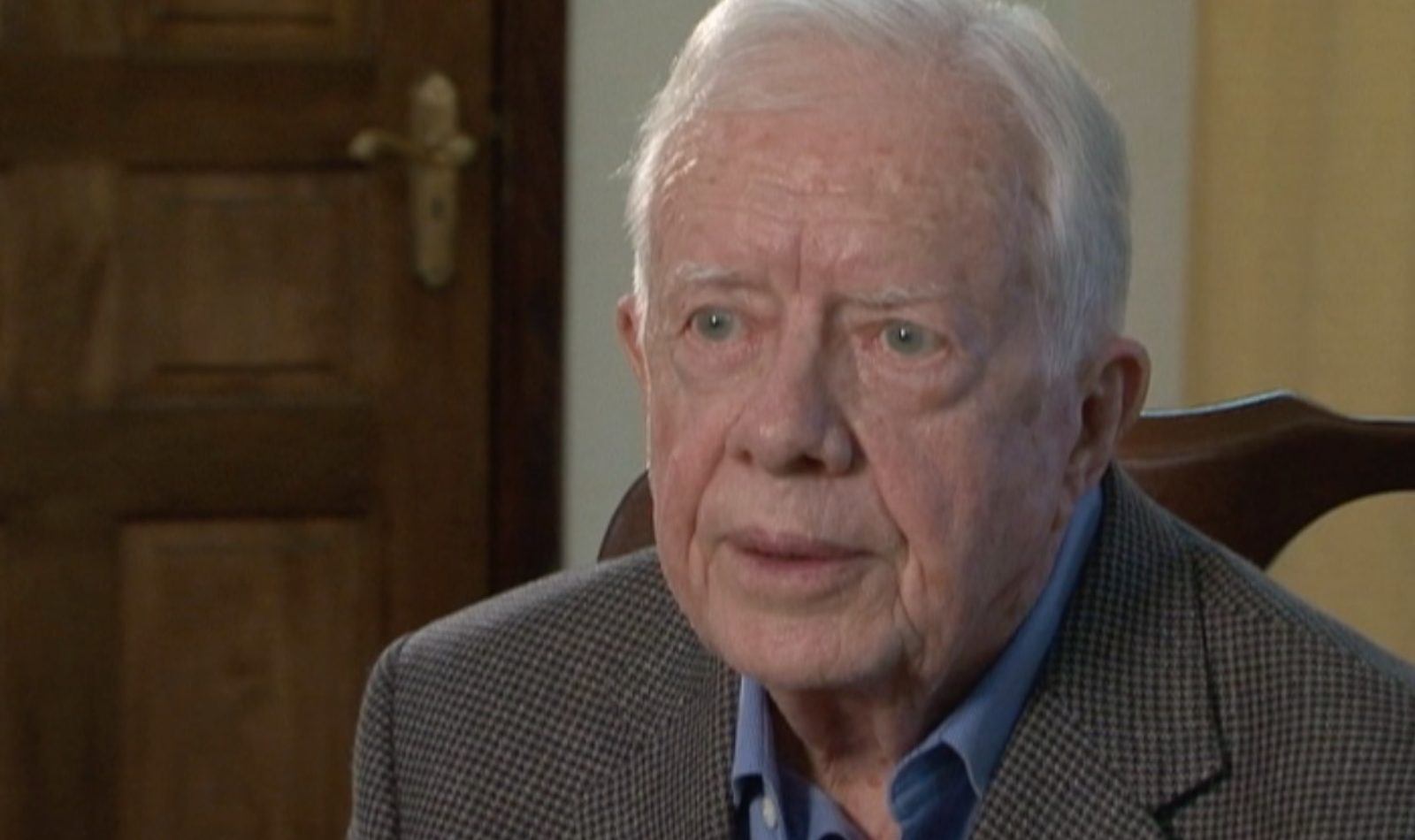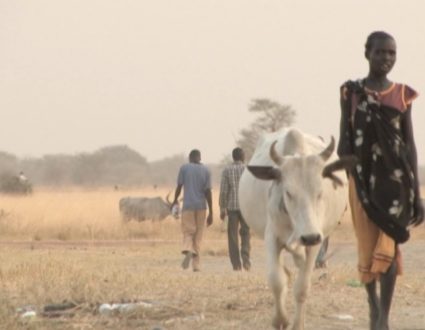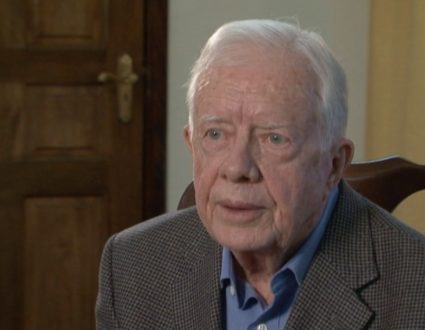Solveig Rennan
Welcome to Under-Told: Verbatim. I’m Solveig Rennan for the Under-Told stories project, we report from all over the world for PBS NewsHour on the consequences of poverty and the work of change agents addressing them. We’ve done extended interviews with hundreds of experts and people making a difference in their communities. In this podcast, we’re revisiting those Under-Told stories, so you can hear changemakers around the world in their own words. This is Under-Told: Verbatim
First a state senator, then governor of Georgia, Jimmy Carter served as President of the United States from 1977 to 1981. His single term was marked by inflation, economic recession and the Iran hostage crisis. But there was a high point that endures to this day.
President Carter
we’re privileged to witness tonight a significant achievement in the cause of peace.
Solveig Rennan
The Camp David Peace Accords he brokered that brought peace between Egypt and Israel
President Carter
a framework for peace in the Middle East.
Solveig Rennan
After Carter left office in 1981, he dove into humanitarian work with his own non governmental organization. He’s worked to eradicate neglected tropical diseases and mediate age old conflicts around the world, including Sudan and South Sudan. Two nations carved out of one after a bitter war that Carter helped end
President Carter
we’ve been working on several issues. And we’ve been dealing with diseases that affect both the Sudanese in the North and Southern part.
Fred de Sam Lazaro
Good morning, Mr. President.
Solveig Rennan
That’s where our director Fred de Sam Lazaro met President Carter in 2010 and again in 2011. It was not just political hostility that festered at the time, so did a dreadful disease: dracunculiasis, better known as guinea worm.
President Carter
So guinea worm is a major challenge for us is one of the most ancient diseases known in the Bible as a fiery serpent.
Solveig Rennan
The waterborne parasite grows up to three feet and lives just below the skin, often crippling its human host. There are no vaccines or medicines to treat it. The only cure is to slowly painfully extract it over days. Once a widespread threat, many countries have beaten guinea worm, but eradication remained elusive in Sudan and South Sudan.
President Carter
We reduce that the incidence from more than two and a half million cases down to about 2500 cases in the whole world. And the last major holdout will be here in Southern Sudan. So we’re very excited about that. The prospect of a final, total eradication of this disease from the face of the earth.
Fred de Sam Lazaro
We’ve been hearing a lot of news reports lately about the unsettled conditions in the south, an escalation violence for a variety of reasons. And I’m just wondering how much you sense that’s hindering the guinea worm campaign in its final stretch.
Solveig Rennan
Nearly a decade later, the violence, at the time part of the struggle for independence in the south, has never abated, as rival factions of leadership battle for power in the newly independent South Sudan. So the guinea worm campaign remains in that final stretch. Still, the former president credits the Carter center’s approach for moving the effort this close to the finish line
President Carter
The Carter Center is is deeply immersed in the life of the people in the most remote villages of Sudan and other nations in which we’ve been involved and I think we have built public trust and an urge to, to do the right thing for the people. And that’s given us confidence that will be successful here.
Solveig Rennan
Despite his high profile, President Carter made a habit early on to leave his home in Plains, Georgia, and get his own boots on the ground.
Fred de Sam Lazaro
What do you expect, you can impact by actually being here that you couldn’t? He’s sitting in planes and being on the telephone?
President Carter
Well, when I come as a former president, you know, I don’t have any trouble having a direct conversation with with the president of Sudan. So I think that personal involvement of myself has been not only helpful in the overall success of our programs, but highly gratifying. To me personally, it’s one of the finest aspects of my life, to actually go to a village like we will tomorrow to know that they prepared for my coming. They’re very eager to show me the best side of their lives. They are very eager to tell me what their problems are that remain, and to describe the progress that they’ve made. So it’s not only gratifying to me, but also for the villages themselves. And of course, the cumulative effect of all those villages, works its way up to the president of a nation or the vice president of a country.
Solveig Rennan
The Carter Center is 38 years old now. That means President Carter has done this foreign aid and diplomacy work almost 10 times as long as he held the job of commander in chief.
Fred de Sam Lazaro
Mr. President, if you extrapolate from your experience in healthcare, in eradication programs, like guinea worm, etc, to the larger modus operandi of the donor aid activities in general, what would you say have been the keys to the success of the Carter center certainly in guinea worm that might be useful elements to incorporate in the larger sort of donor effort to eradicate poverty and disease.
President Carter
Well, I’m a little bit biased about this. When I was president of the United States, the USAID program for us is worse conducted by professionals who work for the government. And some of our successes have changed that dramatically so that most of the actual funds expended and the efforts made by contractors, who quite often have not been component or deeply dedicated to achieving the goal. I think that the hunger of people, particularly in Africa and other places where poverty is a blight, for good health is quite often underestimated and their intelligence. Their ability to deal with their own problems is underestimated. We work with with villagers who quite often have I’ve never seen a textbook never have known what even the word literacy means. And and we have found that they’re just as intelligent just as hard working just as dedicated. They love their children just as much as I do. And we tend to underestimate the quality of the people who suffer from causes beyond their comprehension or grasp. So the more that the rich countries on earth can deal generously and persistently and intimately with the people in the suffering communities on Earth, the better off the whole world will be. And I’ve been very grateful that the Carter Center has been able not only to raise funds, but we actually go into the villages into the homes of people and and work directly with those who are afflicted. And I think that personal relationship needs to be emphasized as funds and and medicines and other supplies or allocated by governments themselves.
Fred de Sam Lazaro
There are people who would say that billions have been poured into aid without the payoff that one needs. Is that the key basically the that personal on the ground relationship? Is it an accountability issue? To whom should the effort be accountable to the poor people to the government’s? What works for you?
President Carter
Well, I’m biased about it because, you know, I say the extremely high efficiency of what the Carter Center does with limited funds, but we’re actually in the villages. You know, we work with the village chiefs and with the people who have particular affliction, and when we have funds, we make sure that every dollar is spent wisely and effectively. But the more interruptions you have between between the allocation of funds and the ultimate expenditure, the more waste there is and the more impersonal the relationship is. Our, the workers for the Carter center are just almost part of the families of the people who still suffer from guinea worm and … and other diseases that we deal with here in the south. So I think that that needs to be re emphasized. There is been a much more impersonal channel of delivery of humanitarian services between the major donors and his major governments and international institutions and the people who are in need. And I think that’s one of the bridges that the Carter Center has never permitted to arise. We raised the funds from private donors almost exclusively, and we actually put the food or the medicine into people’s mouths and teach them how to use a filter cloth. And we monitor the results of our work. So that’s a difference. I’m not criticizing other people because I know it It can’t be like the Carter Center. But I think that has been a trend in our federal government agencies in the past years, where we used to have most of the actual workers who delivered services being part of the US government. Now, it’s private contractors. And sometimes we see that those private contractors don’t have the well being of the people nearly as much in their hearts and minds. As I do the allocation of funds. It comes to them.
Fred de Sam Lazaro
You’ve talked a lot about how key it’s been to get the confidence of the people being served. How did your workers, how did the Carter Center achieve that? How can you gain people’s confidence for a campaign like this?
President Carter
It’s not easy, because guinea worm is a biblical disease has been in effect more than 10,000 years and many other countries in addition to the one where we have worked and and the people had gotten accustomed to guinea worm as an unavoidable and persistent and never ending disease. And when we went into the first villages and through interpreters talk to the chiefs of the village or the witch doctors and so forth, they will tell us that it was caused by the drinking of goat’s blood, or it was caused by the confluence of planets, or curse, a special Curse of God on that village, or the sins of the ancestors. They had no idea that it came from their pond of water. In fact, the ponds of water were looked upon as sacred. If that particular rain fill pond hadn’t been there, the village wouldn’t have existed, they wouldn’t be alive. So in a way, what we told them about guinea worm was to them sacrilegious invalidated their religious beliefs and it was only by inducing them to try our technique. For a year, that we were able to get them to comply. And of course, we said that the curse was on that upon was an effect sacred, but there was a curse on their part. And that was a guinea worm eggs and existed in it. And if they would just help us remove those guinea worm eggs from their pond, or from the drink of water that they took out of the pond, then that curse could be removed from their pond and their village forever. So we had, you might say, not only a philosophical, but also a theological explanation to make. And there was another problem that we had in a number of villages, and that was that the witch doctors made their livelihood from treating guinea worm. And you can’t cure anyone, but you have to treat it during the painful 30 days or so that the guinea worm is emerging. And the witch doctors didn’t want to see in effect, the guinea worm disease eradicated, because it did away with a lot of their potential income. So we had all those problems to address. And I believe I mentioned earlier that we had 23,600 villages in which we found guinea worm and once we started, and we had that kind of problem to overcome in almost every village,
Solveig Rennan
Carter is no stranger to theological explanations. He spoke openly about his Christian faith on the presidential campaign trail, one of the first candidates to do so.
Fred de Sam Lazaro
Well, the role of your faith, how much of that is a driver in your work? And in? Another part of that question, sir, is, is the enormous faith and piety the one sees amid so much suffering in these countries just does that impress you as as well?
President Carter
Well, it does. My religious faith has been a driving force in my life ever since I was a little child, I’ve been teaching Bible lessons since I was 18 years old. I still teach every Sunday that I’m home in Plains, an average of about 35 times a year. And this is provides me with self assurance that God cares about me and other people. And it also is a performs a, say a standard of ethical moral commitments that I tried to observe. I’m not bragging on myself, but I’m trying to answer your question. When I was President of the United States, I tried to implement the teachings I had learned as a religious person. I worship the Prince of Peace. I tried to preserve the peace. We never lost a muscle or fired a bullet or dropped a bomb while I was president. And still we protected the interest of my country. And I would say that it’s, my religion is still a vibrant part of my life, very pleasant, challenging. And one that I presume I’ll have the rest of my days.
Solveig Rennan
Our interviews with President Carter were originally featured on the PBS program Religion and Ethics News Weekly in the stories Carter vs Guinea Worm in 2010, and A New State: South Sudan in 2011. To see how the guinea worm is extracted from a human host, or learn more about the referendum for independence, go to undertoldstories.org. Coming up: in our next few episodes we’ll learn about Chef Sean Sherman’s movement to revitalize Native American cooking.
Sean Sherman
You know, like around here you can’t get more Minnesotan than those foods ’cause they’ve been here longer than Minnesota was a concept
Solveig Rennan
and the lethal legacy that land mines leave behind.
Rebecca Letven
If an area is contaminated by landmines sometimes they’ve just don’t have a choice other than to enter that minefield in order to make a living.
Solveig Rennan
You can find every Under-Told: Verbatim episode, virtual reality 360 experiences and our entire library of Under-Told news reports from around the world at under told stories.org This episode was hosted by me Solveig Rennan and produced and edited by Simeon Lancaster. The interviews were conducted by our director Fred de Sam Lazaro. Under-Told: Verbatim is brought to you by the Under-Told Stories project at the University of St. Thomas in Minnesota. As always, thanks for your support.
Carter was President of the United States from 1977 to 1981
He’s worked to eradicate neglected tropical diseases and mediate age-old conflicts around the world including Sudan and South Sudan–two nations carved out of one after a bitter war that Carter helped end.



